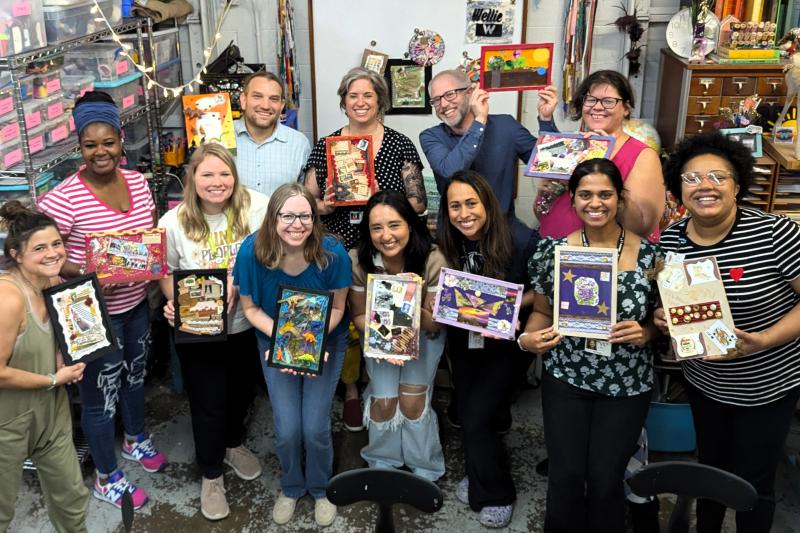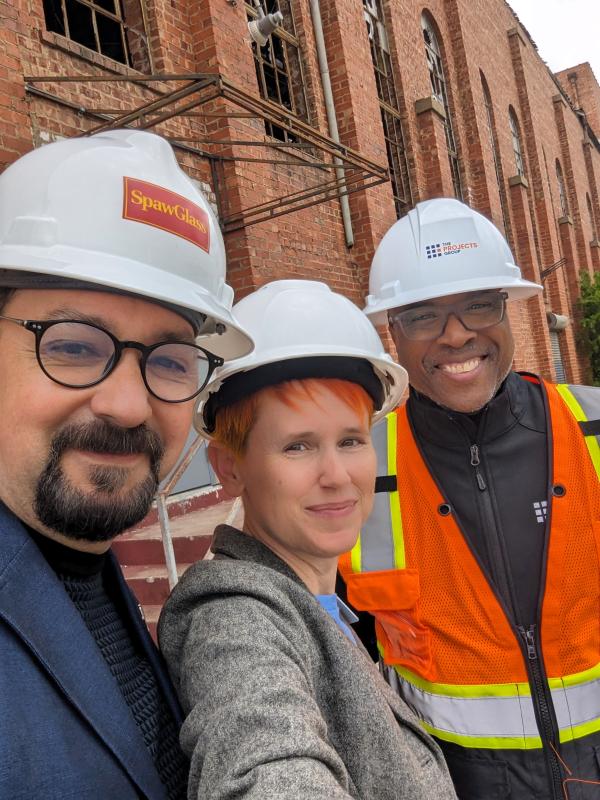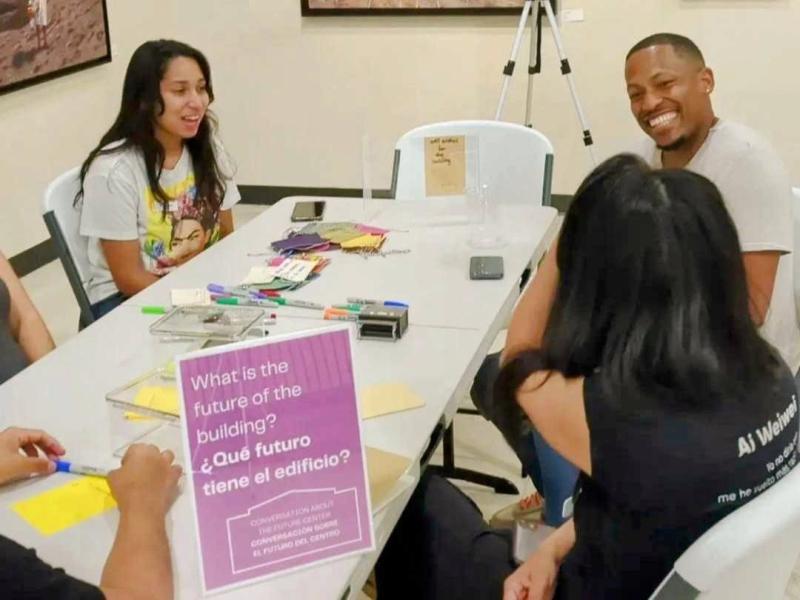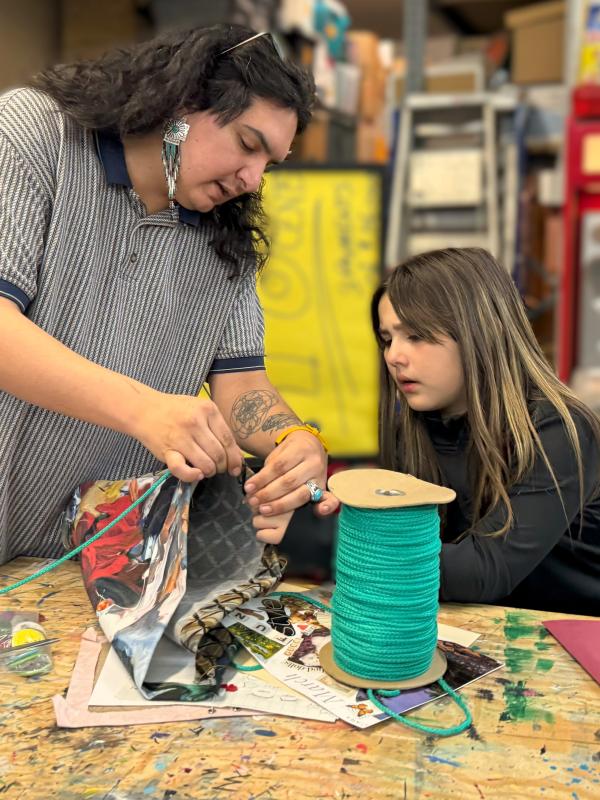ArtsHERE Grant Spotlight: The Welman Project (Fort Worth, Texas)

Teachers participate in a free professional development workshop focused on increasing arts accessibility through creative reuse. Photo courtesy of the Welman Project
The Welman Project began as an unexpected inspiration in 2008 when co-founder Vanessa Barker, working as an assistant project manager for New York Fashion Week and a preschool teacher in San Francisco, California, saw potential in discarded materials. After 25 pounds of Instant Snow Powder from a fashion show were set to be scrapped, Barker’s inner teacher monologue envisioned the fun that students could have and donated the snow to a local elementary school. This sparked the idea of repurposing event leftovers for educators, and soon Barker and her team were driving around the city, delivering materials to schools. After moving back home to Fort Worth, Texas, in 2014, she continued to grow the project, aiming to provide students with increased access to arts education. Taylor Willis, executive director of the Welman Project, said “Growing up together in Fort Worth, we [Barker and Willis] were fortunate to have access to exceptional arts education that deeply shaped who we are today, so our hope is for every student to have that same opportunity to explore their creativity.” Today, the Welman Project thrives on its mission to support educators by making reuse a resource for creativity in the classroom.
The Welman Project is one of 112 organizations receiving an ArtsHERE grant as part of a new pilot program from the NEA designed to support projects nationwide that will strengthen organizations’ capacity to sustain meaningful community engagement and increase arts participation for underserved groups and communities. A partnership with the U.S. Regional Arts Organization (RAO) South Arts and in collaboration with the other five RAOs, ArtsHERE is focused on organizations that have a demonstrated commitment to equity within their practices and programming.
The Welman Project’s ArtsHERE funding will support strategic planning and cultural competency training as they launch a community tool library and makerspace within the future Fred Rouse Center for Arts and Community Healing, a site once used as a Ku Klux Klan auditorium. This grant will help ensure the tool library and makerspace operate effectively and sustainably as they expand into a majority Hispanic community.
In an effort to expand beyond schools and make creativity affordable and accessible to the entire community, the Welman Project partnered with Transform 1012 N. Main Street (T1012) in 2019. By 2021, a pilot program for a tool library and community workshop was established, providing artists and families with access to equipment and materials and removing budget barriers to their creative projects. T1012’s focus on the adaptive reuse of the Fred Rouse Center aims to transform the building into a hub for creative and community-driven initiatives in a predominantly Black, Hispanic, and immigrant neighborhood. “The bricks of the building remain as a reminder that almost 4,000 people would routinely attend events to learn how to hate others. It is important to remember past mistakes so that we can learn and change. We envision the building will become a place for reflection, hope, and healing for all.” The transformation of this building into a space for arts and healing has also received support directly from the NEA through grants to the Welman Project and T1012 for planning activities and architectural design fees.
We spoke with Willis about the organization’s commitment to repurpose materials for educational use, the design goals for the Fred Rouse Center, and the importance of this project in transforming the space from a former site of hate to one of healing and inclusivity.

Carlos Gonzalez-Jaime, executive director of Transform 1012 N Main Street (left), Taylor Willis (center), and Alfred Walker, project executive at the Projects Group (right), in front of the future Fred Rouse Center. Photo courtesy of the Welman Project
NEA: Can you share more about what your organization does?
TAYLOR WILLIS: We serve educators, artists, makers, and families through three main programs: the Educator Resource Program, with a warehouse full of unlimited free classroom materials and curriculum-enhancing creative reuse ideas; the Curiosity Shop, where anyone can shop for affordable arts and craft supplies and purchase work by local artists; and our Creative Reuse Education Program, a makerspace with tools and workshops that empower everyone to explore their creativity.
NEA: What need in the community sparked the partnership with T1012?
WILLIS: My co-founder Vanessa and I were lucky enough to meet Daniel Banks and Adam McKinney while they were developing the vision for Transform 1012, and we immediately knew we wanted to support this incredible project however we could. Meanwhile, we were in the process of opening a small makerspace in our building, primarily serving educators, but we knew that the need for creative space in Fort Worth was much bigger. Everyone deserves access to equipment and space to explore, design, learn, and take creative risks, and that access is currently severely limited by economic status. The Welman Project focuses on repurposed materials as a way to create equitable access to resources, so being part of this beautiful repurposing project just fit perfectly.
NEA: Can you share some of the design features that will symbolize the transformation of the Fred Rouse Center to a place of healing and inclusivity?
WILLIS: We are still in the early stages of the design phase, but several key concepts are already guiding the transformation. One of the core ideas is moving from closed, confined spaces to more open, welcoming areas—symbolizing openness and transparency. There will also be a progression from darker spaces to lighter, brighter environments, representing a journey from pain and division to healing and hope. Another important element is the connection between the north and south sides of the building, reinforcing the theme of bridging divides.

Germane Barnes (right), principal of B-arn-S Architects, discusses the future of the building with community members at a Transform 1012 N Main Street Community Conversation in August 2024. B-arn-S Architects and ch_studio are the design architects for the Fred Rouse Center for Arts and Community Healing. Photo courtesy of the Welman Project
NEA: During the design phase, what are the ways in which diverse voices, particularly those historically marginalized, are prioritized?
WILLIS: We are actively collaborating with our design architects to ensure that diverse voices, particularly those from historically marginalized communities, are central to the design process. Through a series of Community Conversations, we are creating spaces where people can share their visions, address community needs, and embrace healing as part of the transformation of our cultural hub.
These conversations aim to: Provide a space for individuals to heal as they imagine what the Fred Rouse Center can become; create broader access to the design process for Fort Worth’s diverse communities and constituencies; strengthen connections between people, our organization, the coalitions we work with, and the space itself; and ensure that the perspectives and lived realities of these communities are integrated into the design of the building. Ultimately, our goal is to develop a space that truly reflects the needs, aspirations, and dreams of the communities we serve.
NEA: What are some specific tools, resources, or programs that will be offered through the new makerspace that might not have been possible before?
WILLIS: Initial investment in equipment and supplies is often a huge barrier to entry, whether you’re a professional artist wanting to try new mediums, an entrepreneur with an idea to test out, or a student looking to find your passion. With equipment for woodworking, metalworking, fiber arts, design and prototyping, A/V [audio/visual] production, and more, this space will open possibilities for so many people to find a creative outlet they love or a marketable skill to launch a career. The makerspace will double as a scene shop, both for the attached performing arts space, and for schools and community theater groups that don’t have their own. We’ll host fix-it clinics where people can learn to repair broken goods instead of throwing them away, and the tool library will empower people to do things like make home repairs that would otherwise be cost prohibitive. In addition to the artistic, social, and economic benefits, there’s so much environmental benefit our community will gain from reusing and repurposing in this space. But I think I’m most excited about the community aspect—having a place for people to pass down handcrafting skills, work together on new innovations, and build relationships across generations and cultures through the experience of creating together. It will be a transformative space for our community.

Student Clara Ortega (right) learns sewing skills by using outdated interior design samples to create her own bag, under the guidance of teaching artist Matti Candelaria (left). Photo courtesy of the Welman Project
NEA: What has been the most personally meaningful aspect of working on the Fred Rouse Center, and how has the community’s response influenced your approach?
WILLIS: What’s been most meaningful to me has been the collaborative nature of the project, and the incredible changemakers I’ve been able to meet and work with. It’s been an immense privilege to work alongside and learn from people like the iconic Dr. Opal Lee, known as the “grandmother” of Juneteenth [and a founding board member of T1012], and Fred Rouse III, whose grandfather was the victim of a racial terror lynching in 1921. Their strength in working tirelessly toward community healing despite the horrors inflicted on their families is humbling and inspiring. As Dr. Lee says, “If people can be taught to hate, they can be taught to love.”
So many people, myself included, didn’t know the history of this building we’ve seen all our lives, so sharing that history, and gathering the missing pieces, has been a vital part of the process. I’m grateful to everyone that has shared their stories, supported the progress, and driven us to do better. Everyone we talk to leads us to another important voice in the process. Our role as the coalition is to continue to listen and learn so we can best meet the needs of our community.
NEA: Looking beyond the opening of the center, what are the long-term goals for its role in confronting systemic racism and promoting social justice through the arts?
WILLIS: As an act of reparative justice, our long-term goal is to collaborate with organizations and artists that are dedicated to confronting systemic racism and promoting social justice. Our mission focuses on returning resources to the communities that were historically targeted by the Ku Klux Klan, including Black, Catholic, Hispanic, immigrant, Jewish, and LGBTQQ2SPIAA+ populations. By working together with these groups and individuals, we aim to support and amplify efforts that address the violence and economic marginalization these communities have endured.
To learn more about ArtsHERE and the other organizations receiving grants, visit our newsroom.




